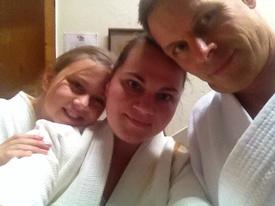Bridezilla - Just Venting
Replies
-
 0
0 -

Yum...0 -
More men in kilts!



Just don't become this guy .... http://www.shoutingatco.ws/2011/05/13/daily-sport-brides-och-aye-the-poo/
These are beautiful.0 -
Now I'm in.True, although I read this all assuming the OP was Scandinavian (Viking) based on her username (Asa Thor's Woman ... don't tell me that's not Norse!) and the friends are Scottish, and she was more referring to herself with the Viking comment.
OTOH, there is some decent evidence that suggests a common ancestry. I believe the Picts, early settlers on the Isle of Britain (pre-Roman) actually came from Scandinavia at some point. So ... there's that.
I'm both Scottish and Norse, btw
Oops, another thread derail (though probably not as fun as the make up one that I came in too late for)
The Norse were the Germanic people of Scandinavia, in effect the descendants of weaker Germanic tribes that were unable secure richer lands further south. They migrated into Europe along with the other Germanic tribes as part of (if memory serves) the last indo-european wave of migration.
No one knows exactly what the Picts are, but they occupied land in Europe prior to the arrival of the Germanic tribes. There is evidence that they either coincided or pre-dated the Celtic migration into Britain. The Celtic peoples had migrated into Europe before the Germanics (roughly at the same time as the Italics, I believe).
As far as I know, there is no evidence (linguistic or archaeological) of a cultural link between the Picts and the Germanic tribes. The working hypotheses I've read are that the Picts were either a more primitive Celtic population that was displaced north-wards by the Gaels and Brythonics and then southward by the Scots, or that they were a pre-Indo-european population that was able to fend off enslavement by the Celts.
You may now carry on...
ETA:
Looked it up, the information I had was outdated.
The theory of a Germanic origin of Pictish had existed but it was refuted some time ago. The theory of a pre-Indo-European origin of Pictish, while not completely refuted, has been abandoned. Based on etymological evidence (names and places mostly), Pictish is considered to be Celtic and related to Brythonic.0 -
Norse people were all over the dang place, North America, Africa, the far East, anywhere they could get in a boat. And yes, even Scotland.
New DNA evidence is finding that they spread their seed in so many places, more than we ever presumed based on archaeology or linguistics.
FWIW, I'm using the term "Viking" incorrectly (trying to simplify things for those who don't know, who are most, and that's not a bad thing, we're a fringe community), we're referred to as Heathen people, which can loosely be considered any pre-Christian European Paganism. That's a loaded statement and I know it is, because there were very much so indeed different tribes and such, but generally speaking the meltdown of how that relates to a modern religion is that it's not even remotely uncommon for Scottish, German and Anglo (and more) descended peoples to have a celebration together for their mutual connections and spiritual connections to what are most commonly referred to as the "Norse Pantheon."0 -
And we bring the kilts and mead, which basically means awesome.
:drinker:0 -
Norse people were all over the dang place, North America, Africa, the far East, anywhere they could get in a boat. And yes, even Scotland.
New DNA evidence is finding that they spread their seed in so many places, more than we ever presumed based on archaeology or linguistics.
FWIW, I'm using the term "Viking" incorrectly (trying to simplify things for those who don't know, who are most, and that's not a bad thing, we're a fringe community), we're referred to as Heathen people, which can loosely be considered any pre-Christian European Paganism. That's a loaded statement and I know it is, because there were very much so indeed different tribes and such, but generally speaking the meltdown of how that relates to a modern religion is that it's not even remotely uncommon for Scottish, German and Anglo (and more) descended peoples to have a celebration together for their mutual connections and spiritual connections to what are most commonly referred to as the "Norse Pantheon."
And that's not to undermine the rich lore of the Celts, the Lithuanians, the Finnish, the Swedes, the Germans, the Anglos all of them have their own beautiful and deeply meaningful mythos, but it's my personal observation that most peoples hanging around practicing these ways in modern Oklahoma are part now of mixed European descent, part German, part Irish, part English, whatever, the list goes on and on and on and is actually quite exciting and diverse, but at least for the folks attending these particular event, the kinship does seem to be found under this umbrella and then members bring their own traditions to the table and it really does sometimes turn into a big mix-mesh of old European tradition.
Not sure if that's a good thing or a bad thing, and a lot of people have a lot to say about that common modern phenomenon, but it is what it is, and those are the people we found connections with, so they are the ones that tend to get together and do their thing together.
:-)0 -
I'm glad to hear everything seems to be working out!!0
-
They were all over the place, but not all the time! The Norse have had a very profound impact on Scottish culture (I've heard it argued that early Scots was a mix of Norsk and Gaelic), but I think they only established a presence there after the conquest of the Hebrides which took place in the 8th-9th century AD.Norse people were all over the dang place, North America, Africa, the far East, anywhere they could get in a boat. And yes, even Scotland.
New DNA evidence is finding that they spread their seed in so many places, more than we ever presumed based on archaeology or linguistics.
It can be very hard to keep track of our indo-europeans, all of them liked to spread out all over the place.
We don't even know exactly when the Germanic peoples colonized southern Scandinavia and the Celts Britain. We know each was dominant there starting around 750 and 550 BC respectively, but there are signs of their possible presence as far back as 1250 and 2000 BC (again respectively).0 -
This sounds like it's shaping up to be the greatest Solstice EVAR! Except I'm a little disappointed that the bride and groom will not be skyclad. Congratulations, you just made Frigga cry.0
-
yay! have fun OP. it sounds like it's going to turn out to be a really great party.
 0
0 -
Now I'm in.True, although I read this all assuming the OP was Scandinavian (Viking) based on her username (Asa Thor's Woman ... don't tell me that's not Norse!) and the friends are Scottish, and she was more referring to herself with the Viking comment.
OTOH, there is some decent evidence that suggests a common ancestry. I believe the Picts, early settlers on the Isle of Britain (pre-Roman) actually came from Scandinavia at some point. So ... there's that.
I'm both Scottish and Norse, btw
Oops, another thread derail (though probably not as fun as the make up one that I came in too late for)
The Norse were the Germanic people of Scandinavia, in effect the descendants of weaker Germanic tribes that were unable secure richer lands further south. They migrated into Europe along with the other Germanic tribes as part of (if memory serves) the last indo-european wave of migration.
No one knows exactly what the Picts are, but they occupied land in Europe prior to the arrival of the Germanic tribes. There is evidence that they either coincided or pre-dated the Celtic migration into Britain. The Celtic peoples had migrated into Europe before the Germanics (roughly at the same time as the Italics, I believe).
As far as I know, there is no evidence (linguistic or archaeological) of a cultural link between the Picts and the Germanic tribes. The working hypotheses I've read are that the Picts were either a more primitive Celtic population that was displaced north-wards by the Gaels and Brythonics and then southward by the Scots, or that they were a pre-Indo-european population that was able to fend off enslavement by the Celts.
You may now carry on...
ETA:
Looked it up, the information I had was outdated.
The theory of a Germanic origin of Pictish had existed but it was refuted some time ago. The theory of a pre-Indo-European origin of Pictish, while not completely refuted, has been abandoned. Based on etymological evidence (names and places mostly), Pictish is considered to be Celtic and related to Brythonic.
Awesome, thanks for that info! I knew my sources were iffy, hence the vague "some evidence" and "I believe," but I wasn't clear about that. I'm always happy to get better info
OP - there is a piece that can be worn over the shoulder that is also the tartan plaid, but I don't remember what it's called, that might be what he meant or maybe even making waistcoats/vests out of the tartan. It sounds like a fun event and I'm glad you guys are now coordinating and working together. I love a happy outcome! (I have a bad vice of watching the show Bridezillas, and they never seem to come around/work things out like this)
or maybe even making waistcoats/vests out of the tartan. It sounds like a fun event and I'm glad you guys are now coordinating and working together. I love a happy outcome! (I have a bad vice of watching the show Bridezillas, and they never seem to come around/work things out like this)
and ETA: just looked it up. The part over the shoulder can be called the tartan plaid (pronounced with a long a sound). Although I still am guessing there's another (more accurate) name for it. Most of what I learn about my ancestry's cultures is the old-fashioned way, things passed on from one generation to the next with verbal explanations/storytelling. So I'm sure a lot of errors creep in over the years.0 -
glad it worked out!0
-
ok I felt a little in the dark when I read the term "hand fasting" had to look it up
Handfasting
Handfasting is a historical term for "betrothal" or "wedding". In the Early Modern history of Scotland (16th and 17th centuries), especially in the Hebrides, the term could also refer to a temporary marriage.
Thanks for turning the light on.0
This discussion has been closed.
Categories
- All Categories
- 1.4M Health, Wellness and Goals
- 398.2K Introduce Yourself
- 44.7K Getting Started
- 261K Health and Weight Loss
- 176.4K Food and Nutrition
- 47.7K Recipes
- 233K Fitness and Exercise
- 462 Sleep, Mindfulness and Overall Wellness
- 6.5K Goal: Maintaining Weight
- 8.7K Goal: Gaining Weight and Body Building
- 153.5K Motivation and Support
- 8.4K Challenges
- 1.4K Debate Club
- 96.5K Chit-Chat
- 2.6K Fun and Games
- 4.7K MyFitnessPal Information
- 17 News and Announcements
- 21 MyFitnessPal Academy
- 1.5K Feature Suggestions and Ideas
- 3.2K MyFitnessPal Tech Support Questions








